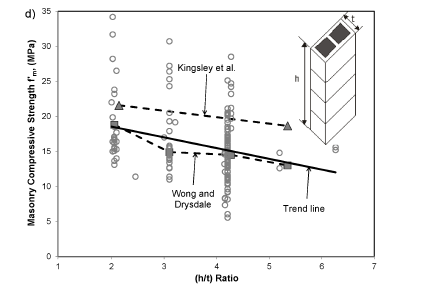1 PhD Candidate, Department of Civil and Environmental Engineering, Carleton University, 1125 Colonel By Dr., Ottawa, ON, K1S 5B6, Canada, salahsarhat@cmail.carleton.ca
2 Assistant Professor, Department of Civil and Environmental Engineering, Carleton University, 1125 Colonel By Dr., Ottawa, ON, K1S 5B6, Canada, ted_sherwood@carleton.ca
ABSTRACT
The competitiveness of masonry as a choice for a building material depends considerably upon its compressive strength as its most important mechanical property. Masonry design codes suggest one of two options to determine the characteristic compressive strength (f’m) of masonry for design. The first option is to test masonry prisms built from the same materials used in actual construction. The second approach is to use tables of masonry strength based on the unit block strength and the type of mortar. These tables are derived from empirical relationships developed based on limited number of test results reported in the literature. These tables are also continuously reported to be conservative, especially for grouted concrete masonry. Thus, as more test results became available it is worthwhile to re-evaluate the tabulated values given by the masonry design codes. In this paper, a large database of compressive test results of masonry prism was used to develop a simple, empirical formula to predict f’m of grouted hollow concrete block masonry based on the contributions of individual materials used in its construction rather than correlated to unit strength only. The assembled database was also utilized to evaluate the reliability of the major international masonry design codes at calculating f’m of grouted hollow concrete block masonry. The codes analyzed include CSA S304.1-04 (Canada), TMS 402-11 (US), AS 3700-2001 (Australia), and BS 5628-2:2005 (UK). The study showed that the proposed formula gives the lowest coefficient of variation and the second lowest average f’m experimental / f’m predicted (f’m Exp / f’m Pred ) ratios. The masonry codes, on the other hand, underestimate the compressive strength of grouted masonry with high coefficients of variation. The proposed formula can replace the tabulated masonry compressive strength values.
KEYWORDS: concrete blocks, compressive strength, grouted masonry
2045.pdf



